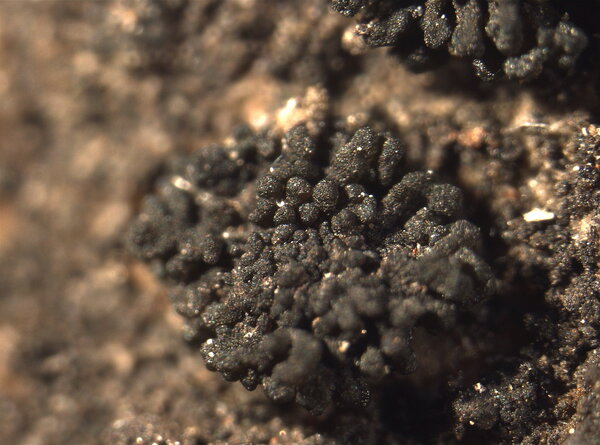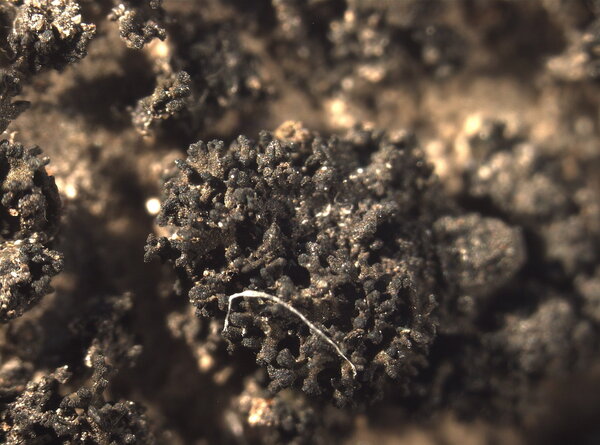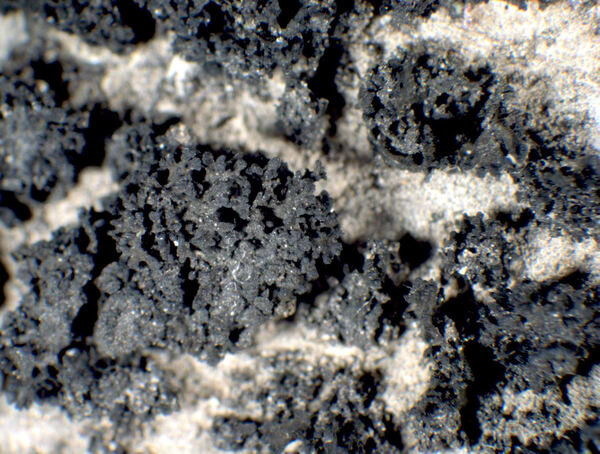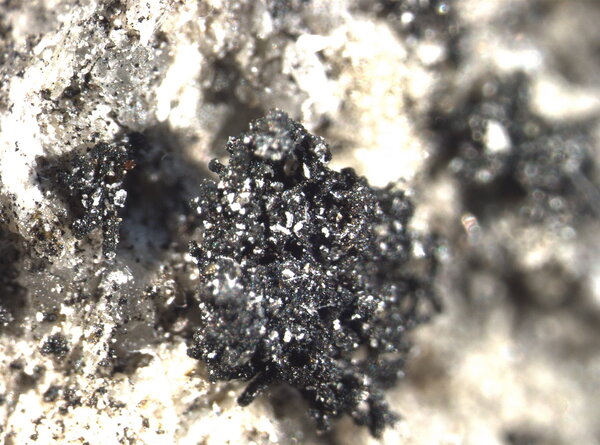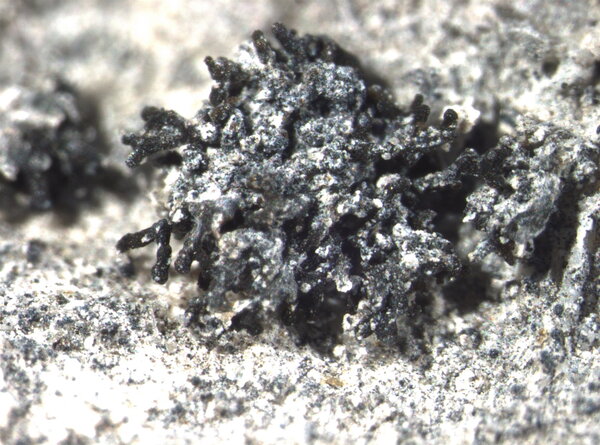Synalissina botryosa (A. Massal.) M. Schultz & M. Prieto
in Prieto & al., Studies in Mycology, 109: 630, 2024.. Basionym: Arnoldia botryosa A. Massal. - Miscell. Lichenol.: 20, 1856.
Synonyms: Lempholemma botryosum (A. Massal.) Zahlbr.; Omphalaria botryosa (A. Massal.) Nyl.; Physma botryosum (A. Massal.) Zahlbr.; Plectopsora botryosa (A. Massal.) A. Massal.
Distribution: N - Frl (Tretiach & Molaro 2007), TAA, Lomb. C - Abr, Mol (Nimis & Tretiach 1999, Caporale & al. 2008). S - Camp (Aprile & al. 2003b), Pugl.
Description: Thallus minutely subsquamulose to subcrustose, homoiomerous, gelatinous when wet, dark olivaceous brown to black, of isolated or aggregated, button-like areoles/squamules densely covered in small, entangled cylindrical lobules, often forming 1-2(-3) mm wide, umbilicate, sometimes marginally lobulate, convex cushions. Lobules up to 0.4 mm long, 0.15-0.2 mm wide, minutely longitudinally striate, with globose hormocystangia at the slightly swollen tips. Apothecia very rare, laminal, globose in section, half-immersed, hemiangiocarpic, developing from ascogones arising in a spheroid tangle of generative hyphae, with a pore-like disc, a thick thalline margin and a pale, thin proper margin. Proper exciple of parallel hyphae; epithecium brownish; hymenium and hypothecium colourless, the hymenial gel I+ reddish brown, K/I+ blue; paraphyses coherent, mostly simple, the apical cells not thickened. Asci 8-spored, broadly clavate, thin-walled, with a distinct amyloid outer cap, but no apical dome, Peccania-type. Ascospores 1-celled, hyaline, ellipsoid, 7-9 x 5-7 μm. Photobiont cyanobacterial (Nostoc, the individual cells 4-5 µm wide, arranged in short chains). Spot tests: all negative. Chemistry: without lichen substances.
Note: on steeply inclined surfaces of hard calciferous rocks with some water seepage after rain, often in sites with cyanobacterial colonies.
Growth form: Crustose
Substrata: rocks
Photobiont: cyanobacteria, filamentous (e.g. Nostoc, Scytonema)
Reproductive strategy: mainly sexual
On otherwise dry surfaces with short periods of water seepage after rain
Commonnes-rarity: (info)
Alpine belt: absent
Subalpine belt: extremely rare
Oromediterranean belt: absent
Montane belt: rare
Submediterranean belt: extremely rare
Padanian area: absent
Humid submediterranean belt: absent
Humid mediterranean belt: absent
Dry mediterranean belt: extremely rare
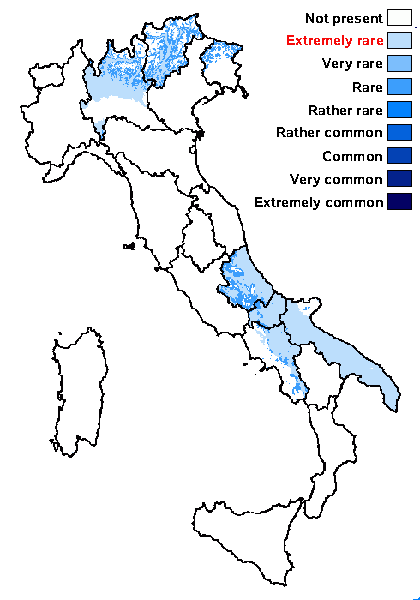
Predictive model
Herbarium samples
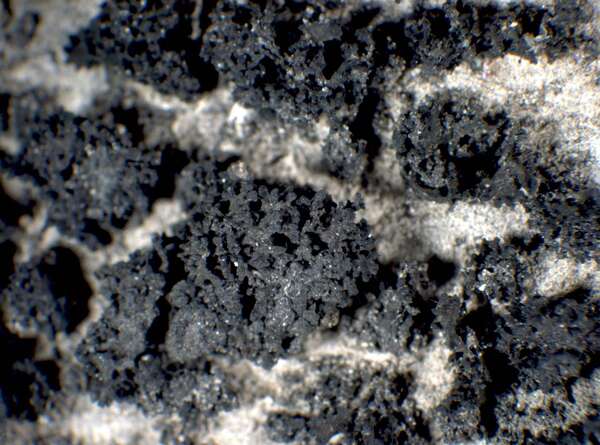

P.L. Nimis; Owner: Department of Life Sciences, University of Trieste
Herbarium: TSB (26671)
2001/11/26
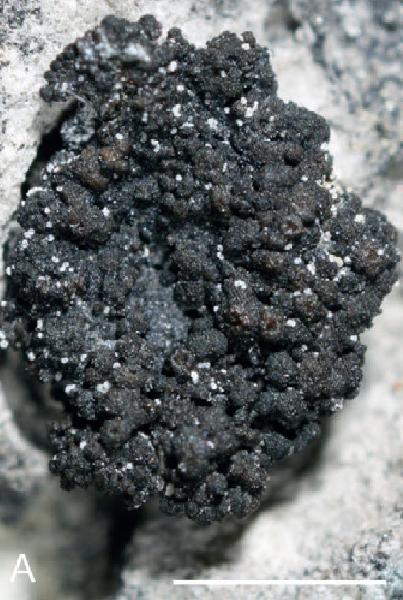
Source: Prieto M., Wedin M., Schultz M. 2024. Phylogeny, evolution and a re-classification of the Lichinomycetes. Studies in Mycology, 109: 595-655. - CC BY-NC-ND
Synalissina botryosa, thallus button like with some emptied hormocystangia (Schultz 05517a). Scale bar: 1 mm
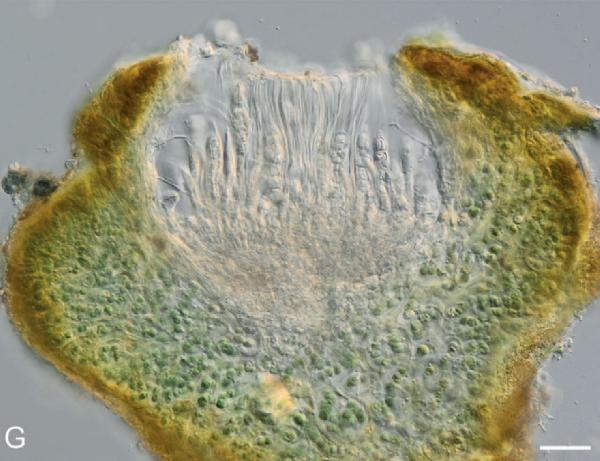
Source: Prieto M., Wedin M., Schultz M. 2024. Phylogeny, evolution and a re-classification of the Lichinomycetes. Studies in Mycology, 109: 595-655. - CC BY-NC-ND
Synalissina
botryosa, apothecium in lobe tip with thick thalline margin and rudimentary proper exciple (Schultz 08406a). Scale bar: 25 µm
Growth form: Crustose
Substrata: rocks
Photobiont: cyanobacteria, filamentous (e.g. Nostoc, Scytonema)
Reproductive strategy: mainly sexual
On otherwise dry surfaces with short periods of water seepage after rain
Commonnes-rarity: (info)
Alpine belt: absent
Subalpine belt: extremely rare
Oromediterranean belt: absent
Montane belt: rare
Submediterranean belt: extremely rare
Padanian area: absent
Humid submediterranean belt: absent
Humid mediterranean belt: absent
Dry mediterranean belt: extremely rare

Predictive model
| Herbarium samples |


P.L. Nimis; Owner: Department of Life Sciences, University of Trieste
Herbarium: TSB (26671)
2001/11/26

Source: Prieto M., Wedin M., Schultz M. 2024. Phylogeny, evolution and a re-classification of the Lichinomycetes. Studies in Mycology, 109: 595-655. - CC BY-NC-ND
Synalissina botryosa, thallus button like with some emptied hormocystangia (Schultz 05517a). Scale bar: 1 mm

 DOLICHENS
DOLICHENS
